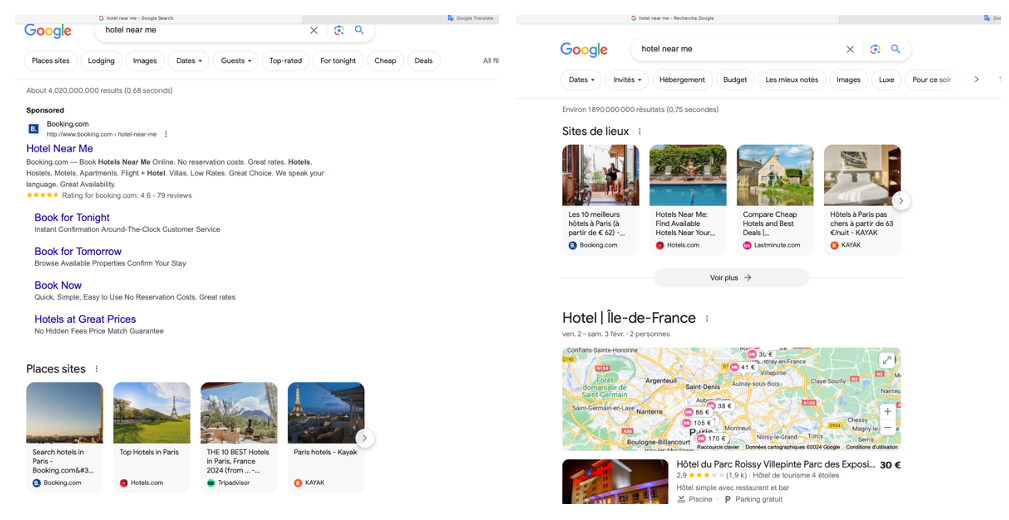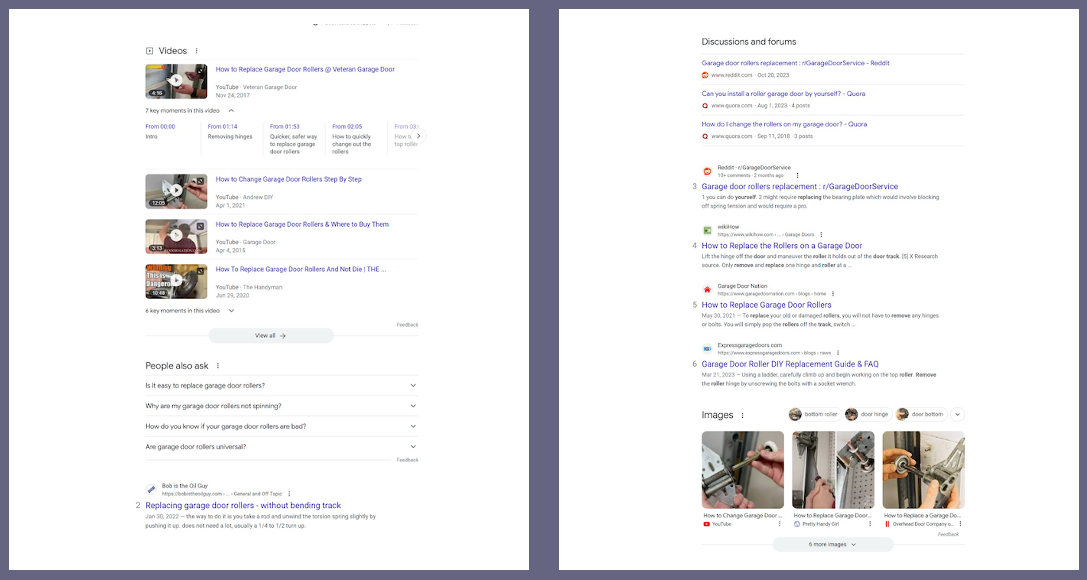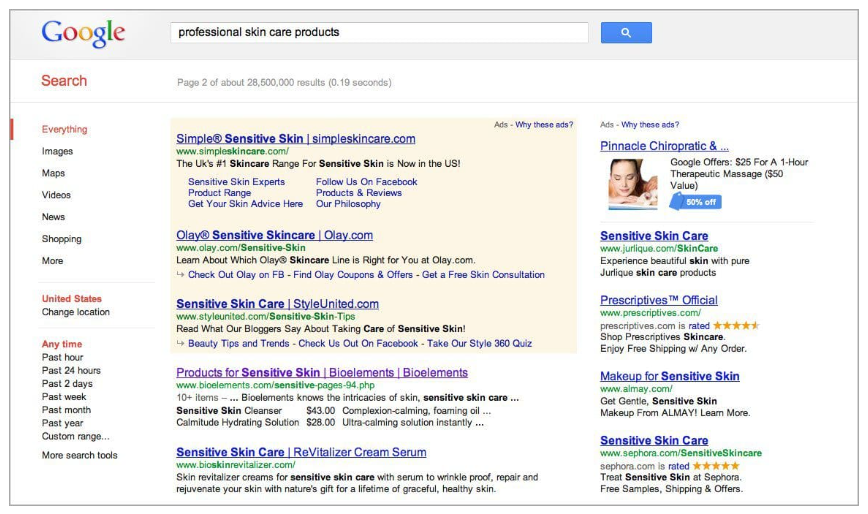New EU Local SERP, Localizing Forums, Ranking Isn't Enough

Google's DMA-Compliant SERP
As Europe's Digital Markets Act (DMA) kicks in, the mostly US-based tech "gatekeepers" it seeks to regulate are rushing to comply. The six companies designated as gatekeepers under the DMA are Alphabet/Google, Amazon, Apple, ByteDance, Meta, and Microsoft. As part of compliance, they're supposed to avoid "self-preferencing" – treating their services/products more favorably than those of third parties. And so, Google is starting to show a new local SERP in Europe that demotes the Local Pack and adds a new Places (Sites) Carousel at the top of the page. The carousel appears to mostly feature third party directories, such as TripAdvisor, Zamato and Hotels.com. The pages are algorithmically driven and so the various SERP features don't always appear in the same place. In the restaurant and hotel query examples we looked at (see video), and discuss on the most recent Near Media podcast, the Places Carousel generally outranks the Local Pack. There's also a second local Pack that sometimes appears. And the whole experience begins with a never-before-seen Google cookie acceptance screen.

Our take:
- Google has been testing various implementations of directory carousels like this in Europe for a few years in anticipation of just such a moment.
- The pages don't look dramatically different than what we have in North America. It remains to be seen whether they drive traffic to publishers.
- The Local Pack sought to enable consumers to connect directly with businesses rather than have to go through directories. This restores directory visibility. How Google selects these directories isn't yet clear.
Forums Invade Local SERP
Google has recently been elevating the visibility of forums, blogs, social content and video as part of its "Hidden Gems" strategy, itself part of the Helpful Content Update. Joy Hawkins recently showed how this is now starting to make its way into local. Her example is a SERP responding to a garage door repair query ("how to replace garage door rollers yourself"). While this query is primarily informational, local companies with relevant content may have ranked in the past. She points out that in the past two weeks the SERP has shifted. The "discussions & forums block" was elevated, as was Reddit, while individual listings demoted. We'll have to see how far this goes; Google will probably be watching clicks by keyword and vertical to see how users respond. The boost Google is giving to forums and social content is intended to deliver more information from real people, with personal expertise, insights or first-hand knowledge. This is also a way for Google to preemptively address the coming AI content crisis and other lower quality content (e.g., spam, lead-gen) that doesn't really serve users.

Our take:
- Elevating online discussions and forums is something of a return to the pre-Google Local days when online groups were often best sources for local business referrals (e.g., Berkeley Parents Network).
- In the past I've argued that somebody needs to create Yahoo Directory 2.0, a next-gen human-curated resource to combat the inefficiency of the SERP. In a way, this is an indirect attempt to do that.
- Google is trusting the moderators of these forums to prevent them from becoming spam-ridden as their profiles rise and marketers take notice.
Ranking Is Not Enough
An excellent new discussion of the historical evolution of the Google's SERP, and its tactical implications, comes from Andy Crestodina. He looks at changes over the years to organic results and ads, contrasting screens from a decade ago and today. He also takes on SGE and discusses its implications. Crestodina makes a fundamental distinction between rankings and placement in the SERP, two things that are often spoken about interchangeably. He argues "rankings are durable, placement is not." What he means is that you can continue to rank for keywords for a long time – depending on how much competing content exists – but changes in SERP features (e.g., video blocks, PAA, snippets, SGE) may push those links further and further down the page. SGE is a case-in-point. Depending on the query, it can push organic rankings well below the fold. As Crestodina explains, Google's SERP today is a much more visual experience, with lots of images and video. He also briefly talks about the AI challenge to Google and concludes with advice on how to respond to all these SERP changes, which will continue evolving. He says, in essence, improve your site, get smarter about SEO and diversify your marketing to other channels.

Our take:
- His advice: create a more engaging website, write better headlines/title tags, publish more video, don't target informational queries, move into other channels and be less dependent on SEO.
- Informational queries are often zero-click and going to be answered increasingly by AI snippets. Focus on higher-intent content/keywords.
- It's also critical for marketers to understand how users engage with the SERP and its features. Through our user research we've discovered lots nuances and variations by searcher intent and vertical.
Recent Analysis
- Near Memo episode 143: Will fired Google Raters be replaced w/AI?; SEO tools often hide the truth; do content strategies need to be updated after 'Hidden Gems' and the decline of Big Social?
Short Takes
- ICYMI: the biggest SEO visibility winners in 2023.
- Bard wins head-to-head search test with ChatGPT an BingGPT.
- Closing a feature gap with ChatGPT, Bard now has an image generator.
- Perplexity may be getting good enough to attract searchers (NYT).
- Saying "SGE won't launch" is "misinformation," says SEL editor.
- Arc Search is a browser, search engine and bot combined.
- Shopify has new AI-supported product image editor.
- Restaurant marketing, mgmt. platform Owner.com raises $33M.
- Walmart is planning to build or convert 150 stores in next five years.
- iOS 17.4 now offers a browser choice screen.
- Should Amazon be legally responsible for the products it sells (WSJ)?
- The mostly positive reviews of Vision Pro are in (here, here, here, here).
Listen to our latest podcast.

How can we make this better? Email us with suggestions and recommendations.

